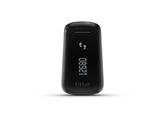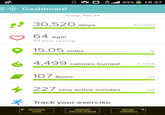Fitbit
Part of a series on Quantified Self. [View Related Entries]
This submission is currently being researched & evaluated!
You can help confirm this entry by contributing facts, media, and other evidence of notability and mutation.
| Navigation |
| About • History • Online Presence • Notable Developments • Search Interest • External References • Recent Images |
About
Fitbit, also known as the Fitbit Tracker is a type of wearable technology used to track fitness metrics like daily step counts, heart rate, and more. Because the devices include a social network as part of their operating system, their use has grown a subculture of self-quantification and personal metric tracking.
History
Fitbit was developed in 2007 in San Francisco, CA, by James Park and Eric Friedman. Their mission is "To empower and inspire you to live a healthier, more active life. We design products and experiences that fit seamlessly into your life so you can achieve your health and fitness goals, whatever they may be."[1]
The first Fitbit was designed to be a small device with a clip-like design, meant to be worn on the body at all times by sliding it over the edge of a pocket or on a bra strap. It was equipped with a pedometer and a sleep tracker, and equipped with a transmitter that sent the data to an application on a desktop computer. Since it was developed at the same time as the iPhone, the first generation did not have an app.[2] Fitbits record steps by using a 3-axis accelerometer, and sets a default goal of 10,000 steps per day for each user.[3]


The device sparked even more interest when the second generation, dubbed the Fitbit Ultra, was introduced. The newer device introduced an altimeter, so that the device could track stair climbing, an even more efficient exercise than walking. The Ultra also contained a stopwatch and the ability to display small messages.[4] Later models, including the Flex and the Charge, have integrated the Fitbit capabilities into a small watch-like device, so users can wear them at all times, even when they change their clothes. There are now nine different types of Fitbits including the Fitbit Aria, which is a scale that records metrics like body mass index when it interacts with a user's Fitbit tracker.[5]
Fitbit sold 200,000 devices in 2011, 1.3 million in 2012, 4.5 million in 2013, and 10.9 million in 2014.[6] It sold 1.6 million during the first three months of 2015; in addition, users who subscribe to its app with a premium service number more than 10 million as of the time Fitbit, Inc filed for their initial public offering for $100 million in May 2015.[7]
Online Presence
While Fitbit maintains its own private social network for its over 10 million users, there are also several public forums where Fitbit users share statistics and other Fitbit-related items. On Reddit, the subreddit /r/fitbit has 11,294 readers, many of whom share screenshots of their achievements or daily life workouts, or discuss how to get motivated and other fitness tips.[8]

Fitbit maintains several corporate Twitter accounts, including @Fitbit, with over 200,000 followers, @FitbitSupport, with over 62,000 followers, and @FitbitUK, with over 24,000 followers.[9][10][11] The corporate Facebook account has over 930,000 likes and the Instragam has over 114,000 followers.[12][13] All of these accounts are used to distribute general health tips and other promotional material. In fitness-related forums, the devices are discussed frequently; for instance, there are 77 threads about Fitbits on the Bodybuilding.com forums, and the main thread has over 25,000 replies in the discussion.[14]
Notable Developments
Fitbit Force Recall
In February 2014, Fitbit announced a voluntary recall of its Fitbit Force wristband tracker, due to 1.7% of customers experiencing a negative skin reaction after wearing the band for an extended period. The reaction was initially thought to be an allergy to nickel used in the wristband, but Consumer Affairs noted that the symptoms were inconsistent with an allergy and that one wearer had a reaction even after wrapping the band in electrical tape.[15]
Search Interest
External References
[3] Fitbit FAQ – How Accurate is my Surge"
[4] Fitbit Blog – Introducing the Fitbit Ultra. Now Track Stairs, and More!
[6] Mobi Health News – Fitbit files for IPO, sold nearly 11 million fitness devices in 2014
[7] MarketWatch – Five things to know about Fitbit before its IPO
[10] Twitter – @FitbitSupport
[14] Bodybuilding.com – Search:Fitbit
[15] Mobi Health News – Fitbit to customers: May the Force not be with you
Recent Videos
There are no videos currently available.
Recent Images 4 total
Share Pin
Recent Images 4 total
Recent Videos 0 total
There are no recent videos.





Comments ( 9 )
Sorry, but you must activate your account to post a comment.
Please check your email for your activation code.